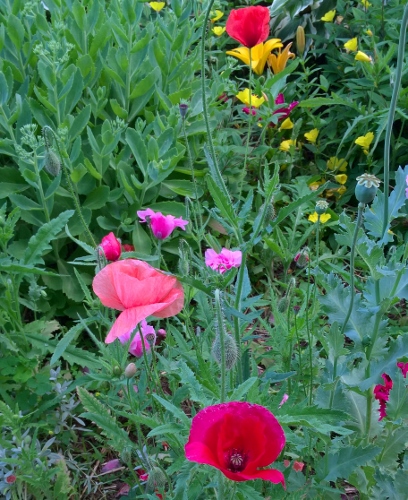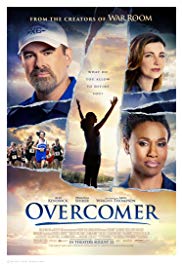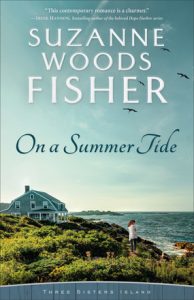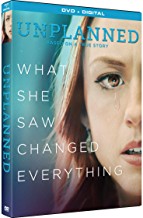
The first month of summer has drifted by like a river, unstoppable.
Most days I was out in the garden first thing in the morning, the time I used to use for writing, and on the days I didn’t garden, I went for a walk. So instead of writing, I breathed in fresh air, wrestled with weeds in the garden and in my soul, and kept my eyes open for the surprises God had hidden away for me.
A kingfisher waited for its breakfast on a branch over the river. I surprised a family of turkeys out for a walk to our compost pile and they scurried away, single file, in agitation. A wasp crawled into a hole in the dirt, and another one (or perhaps many different ones—I can’t tell wasps apart) kept on worrying over a tiny nest that had fallen onto our deck. Gold finches dropped from branch to branch in a willow tree, betrayed only by patches of moving leaves. Flowers budded and bloomed and went to seed. Fuzzy bees tumbled and bumbled in our wild roses, intoxicated by their spicy scent. A small poppy bent down under the weight of a honey bee and our lacy wall of purple hosta blooms buzzes with them. Clouds billowed and drifted and burst open in downpours.
In the evening, when the sky was painted, adolescent cedar waxwings filled the air above the river with giddy bedtime antics and ventured close to gaze at us. When they were herded off to sleep, playing and swooping all the way, the fireflies came out and filled the air with flashes of joy. And then the bats careened above our heads, eating their evening breakfast.
So, we were busy outside, enjoying God’s world.
We have also been busy inside. I’ve taken a cooking challenge from Traditional Cooking School and made all sorts of yummy foods the traditional healthier way—from cheese and soaked grains to fermented apple chutney and sour cream. We used some delicious recipes—the cheese, the salad dressing using homemade mayonnaise and sour cream, the homemade larabars, as well as baked oatmeal, sprouts, and muffins. It was fun, I feel healthier, and now I’ve signed up for a 14 day fermenting challenge to keep on learning. If you are interested in traditional sauerkraut, kimchi, fruit leather, salsa, and more, here’s where you can sign up, too. (It is my understanding that you’re better off buying a month’s membership in the school, since the challenge is included in the membership.)
The year’s homeschool records are almost finished and planning is underway for next year.
We are considering a Shakespeare course, based largely on watching the plays as we did in the past with Hamlet, but also using Leithart’s Brightest Heaven of Invention and the 6-volume Veritas Press Omnibus series. The key to enjoying Shakespeare is to watch the plays, as one is meant to do with plays, instead of reading them painfully slowly as is done in English classes around the world. After all, ‘the play’s the thing,’ and the brilliant poetry and themes shine from the story itself, not from a sterile world of print, explanatory sidebars, and analysis. My kids enjoy Shakespeare and watch him for fun, probably because of this approach.
I am also thinking about modern poetry for English—Mary Oliver’s and Wendell Berry’s thoughtful nature poems especially, but we would need to add some more variety to that. What to choose? The next question is how to study them—immersing ourselves in many poems, or studying a few in depth, or a mixture of the two? There are so many questions and considerations.
And books, so many books! I finished The Beginnings of Western Science by Lindberg and started rereading The Soul of Science by Pearcey and Thaxton. Avicenna, a brilliant Persian scholar a millennium ago, had a huge impact on Europe; I went through Avicenna’s Medicine, a modern translation of some of his influential medical writings and was intrigued by the translators’ insistence that modern medicine can and should learn from him.
Having loved 84, Charing Cross Road, I read Q’s Legacy by the same author—a pleasant ramble through the literary world. Similarly, Traditional Houses of Rural France was a pleasant ramble through the French countryside.
Hyperfocus by Chris Bailey is full of ideas to help adults and teens focus better as well as become more creative. Atomic Habits by James Clear shows how tiny changes can lead to improved habits and result in a changed life. The Oxygen Advantage, which I’ve only dipped into, suggests that proper breathing can greatly enhance concentration as well as physical health. The Miracle Morning almost seems to be a cult book; it points out that morning habits can dramatically impact one’s life. It is one of the reasons that I decided to stop writing in the mornings and instead spend those tree-scented hours looking at and working in God’s world. I’m still thinking about this, not sure whether to continue or not. Mary Oliver’s book Why I Wake Early looks at the whole concept from a nature-loving poet’s point of view.
I dipped into a few books about Alzheimer’s: The End of Alzheimer’s, The Alzheimer’s Solution, You Can Fix Your Brain and, much earlier, Walking Through Twilight. Apparently the disease is increasing rapidly and affecting an enormous percentage of people. We can no longer help my mother, but we can perhaps reduce its likelihood in our own lives since the first two books argue that it can often be prevented. Lifestyle is key, they say.
Learning Contentment by Nancy Wilson will form part of our homeschool Bible study next year, but I also studied it with a group of ladies this summer. What a great book it is to study with others! We learned from the book, argued with it, added important points, and discussed how to apply it to our lives. I plan to write about it later. The Secret Thoughts of an Unlikely Convert by Rosaria Butterfield meshed nicely with Learning Contentment. It is an incredibly inspiring book about God’s power, the amazing results of honest Bible reading, and the impact of the gospel on lives and communities.
I watched Unplanned with a friend and hope to see Hush, about the effects of abortion on women’s health, and 180 before writing about it. (You can watch those documentaries for free at the links.) Years ago I reviewed the book, Unplanned, that the movie is based on, about Abby Johnson, director of a Planned Parenthood clinic who became prolife after witnessing an abortion. It is a powerful story and worth knowing.
An interesting YouTube documentary, The Cloud Mystery, suggests that clouds create climate rather than the other way around. The idea is that cloud formation and climate may be more influenced by cosmic rays than by carbon. I have not reviewed the scientific literature, but I am intrigued.
And, of course, we read the Bible. This year I’m also benefitting greatly from the devotional, Christ’s Psalms, Our Psalms by P. Holtvluwer. Highly recommended, at least up until Psalm 74 which is as far as I’ve gotten.
It has been a good summer so far, with lots of work, thinking, and enjoying, some rest, and the happy promise of another warm month coming up. I am glad to be writing again and hope to be able to figure out how best to fit blogging back into my life.
Happy August to all of you! May you be refreshed this summer so that you can live a contented God-honoring life in whatever circumstances you find yourselves.




